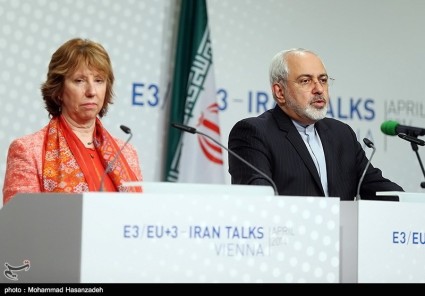Iran and the 5+1 Powers continued to make notable but undramatic progress in nuclear talks, completing a third round of discussions on a comprehensive agreement.
The negotiations in Vienna moved beyond the agenda, established in the first two rounds, to discussion of specific topics such as Iran’s enrichment of uranium, the status of Tehran’s nuclear facilities, and the lifting of US-led sanctions. At the conclusion on Wednesday, the two sides announced another round of talks in Vienna in mid-May.
Both sides said the talks were constructive but emphasized that much remained to be done to confirm a comprehensive agreement by July 20, when an interim deal expires.
Under pressure from domestic challengers, including the military, Iranian officials emphasized that they would insist on the right to enrichment and would resist limits on the number of centrifuges at their Natanz and Fordoo facilities. However, they also indicated that they were open to a re-design of the under-construction Arak heavy-water nuclear reactor, criticized by the US and European powers for plutonium by-product which can be used in a militarized nuclear program.
The Rouhani Government did not only face sniping on the nuclear issue from hardliners and the Revolutionary Guards. The President’s critics, including Grand Ayatollahs, continued the campaign to box in Rouhani on the cultural front. They warned against an opening-up of the Internet and media and continued to rebuff releases of political prisoners through references to the threat of “sedition”.
The Government also faces the imminent test of the introduction of a second phase of subsidy cuts. The move is needed to correct a first phase, under the Ahmadinejad Government, in which expenditure far exceeded revenues. However, it threatens price rises of up to 60% on commodities and services, reversing Rouhani’s success in bringing down the 40%+ rate of inflation he inherited last August.
FORECAST
As long as the Rouhani Government can point to steady progress in the nuclear talks, while claiming its defense of Iran’s fundamental position, it will retain the Supreme Leader’s support.
At the same time, the escalation in challenges from all sides — MPs, clerics, and military commanders — is threatening to curb the President, even if a comprehensive agreement is on the way. Not only is his campaign for cultural “openness” receding; he is also facing attempts by groups, including the Revolutionary Guards, to protect their economic interests and thus curb his attempt to reshape Iran’s economy after years of mismanagement.
FEATURED ANALYSIS
Supreme Leader Warns of US “Bullying” & Says Nuclear Activities to Continue

